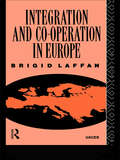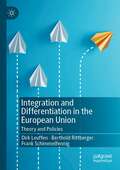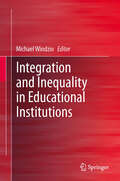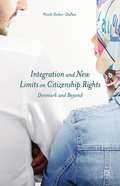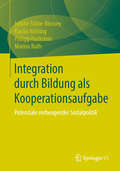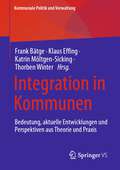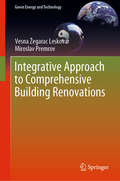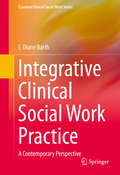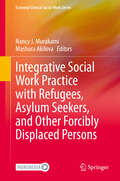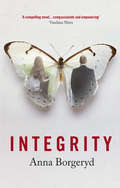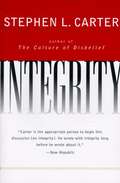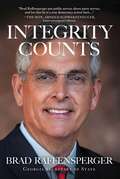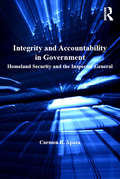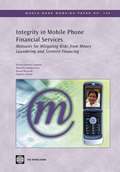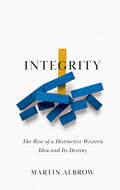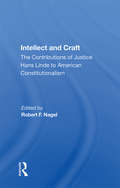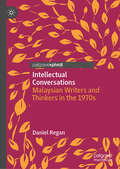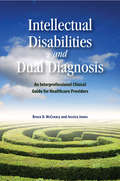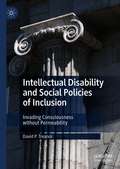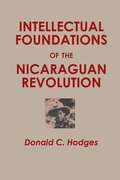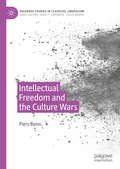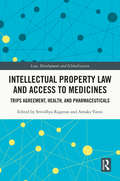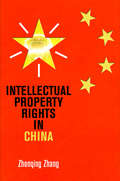- Table View
- List View
Integration and Co-operation in Europe
by Brigid LaffanAn ideal introductory text for students studying the EU, International politics and organisations, or economics: Laffan clearly explains the evolution and extent of European integration in areas ranging from industrial development to international relations and considers the problems that new political and economic demands from the East may raise.
Integration and Differentiation in the European Union: Theory and Policies
by Frank Schimmelfennig Dirk Leuffen Berthold RittbergerFar from displaying a uniform pattern, European integration varies significantly across policy areas and individual countries. Why do some member states choose to opt out of specific EU policies? Why are some policies deeply integrated whereas others remain intergovernmental? In this updated second edition, the authors introduce the most important theoretical approaches to European integration and apply these to the trajectories of key EU policy areas. Arguing that no single theory offers a completely convincing explanation of integration and differentiation in the EU, this thought-provoking book provides a new synthesis of integration theory and an original way of thinking about what the EU is and how it works.
Integration and Inequality in Educational Institutions
by Michael WindzioThis volume addresses questions that lie at the core of research into education. It examines the way in which the institutional embeddedness and the social and ethnic composition of students affect educational performance, skill formation, and behavioral outcomes. It discusses the manner in which educational institutions accomplish social integration. It poses the question of whether they can reduce social inequality, - or whether they even facilitate the transformation of heterogeneity into social inequality. Divided into five parts, the volume offers new insights into the many factors, processes and policies that affect performance levels and social inequality in educational institutions. It presents current empirical work on social processes in educational institutions and their outcomes. While its main focus is on the primary and secondary level of education and on occupational training, the book also presents analyses of institutional effects on transitions from vocational training into tertiary educational institutions in an interdisciplinary and internationally comparative approach.
Integration and New Limits on Citizenship Rights
by Nicole Stokes-DupassIntegration and New Limits on Citizenship Rights is a state-centered analysis of citizenship, immigration and social identity. It explores the increasing role of nation states as critical actors in using social policy to affect the social location of immigrants and ethnics and also to redefine what it means to be a full citizen.
Integration durch Bildung als Kooperationsaufgabe: Potenziale vorbeugender Sozialpolitik
by Sybille Stöbe-Blossey Karola Köhling Philipp Hackstein Marina RuthDas Buch enthält die Beschreibung und Ergebnisse der Studie „Kooperation von Akteuren vorbeugender Sozialpolitik. Eine Analyse am Beispiel der Berufsorientierung jugendlicher Flüchtlinge“. Auf der Basis eines theoretischen Rahmens zur Analyse von förderlichen und hemmenden Faktoren für Kooperation wurden qualitative Interviews mit lokalen Akteuren – Koordinierungsstellen, beruflichen Schulen, Jugendhilfe, Arbeitsverwaltung – geführt und ausgewertet. Der Band stellt Rahmenbedingungen, Probleme und Chancen für die Kooperation auf lokaler Ebene dar, gibt einen Einblick in die Praxis der Förderung von Integration durch Bildung und diskutiert Möglichkeiten für die (Weiter-)Entwicklung von Kooperation.Der Inhalt• Politikfeldübergreifende Kooperation in der vorbeugenden Sozialpolitik: Grundlagen • Kooperationen auf lokaler Ebene: Empirische Analysen am Beispiel der Berufsorientierung für jugendliche FlüchtlingeDie Autor_innenProfessor Dr. Sybille Stöbe-Blossey ist Abteilungsleiterin am Institut Arbeit und Qualifikation, Abteilung Bildung und Erziehung im Strukturwandel (BEST), der Universität Duisburg-Essen. Dr. Karola Köhling, Philipp Hackstein und Marina Ruth sind wissenschaftliche Mitarbeiter_innen am Institut Arbeit und Qualifikation, Abteilung Bildung und Erziehung im Strukturwandel (BEST), der Universität Duisburg-Essen.
Integration in Kommunen: Bedeutung, aktuelle Entwicklungen und Perspektiven aus Theorie und Praxis (Kommunale Politik und Verwaltung)
by Katrin Möltgen-Sicking Thorben Winter Frank Bätge Klaus EffingDieses Buch greift ein Thema auf, das sowohl für die kommunale Praxis als auch für die Forschung von aktueller Relevanz ist: die Integration in Kommunen. Neben Themen von allgemeiner Bedeutung wird auch die organisatorische Perspektive der Integration in Kommunen behandelt. Die Teilhabe und Partizipation bildet einen weiteren Themenschwerpunkt des Bandes. Nicht zuletzt wird die Integration in der kommunalen Praxis unter verschiedenen Blickwinkeln beleuchtet und diskutiert.
Integration through Law: Asean's External Agreements
by Marise, Cremona and Kleimann, David and Larik, Joris and Lee, Rena and Vennesson, Pascal Cremona Marise David Kleimann Joris Larik Rena Lee Pascal VennessonASEAN is coming of age as an international actor and international treaty-maker. To date, more than two hundred external agreements and other instruments have been concluded in the name of ASEAN. This book provides the first systematic account of the legal framework governing ASEAN's burgeoning external relations practice. It focuses in depth on ASEAN's wide-ranging mandate to promote its values and principles in the wider region and beyond, as well as the highly intergovernmental, and at times haphazard, handling of the bloc's relations with the outside world. Furthermore, it reveals that there are two basic meanings of ASEAN in its international dealings, which have important implications under international law: ASEAN as an international organisation with its own legal personality and ASEAN as the collectivity of its member states. This timely and thoughtful book is a valuable resource for practitioners and scholars of international law, ASEAN law, international relations, regional integration and governance.
Integrative Approach to Comprehensive Building Renovations (Green Energy and Technology)
by Miroslav Premrov Vesna Žegarac LeskovarThis book presents a new approach to building renovation, combining aspects of various professional disciplines, integrating green building design, structural stability, and energy efficiency. It draws attention to several often-overlooked qualities of buildings that should be comprehensively integrated into the context of building renovation.The book presents an overview of the most important renovation approaches according to their scope, intensity, and priorities. Combining basic theoretical knowledge and the authors’ scientific research it emphasizes the importance of simultaneous consideration of energy efficiency and structural stability in building renovation processes. It simultaneously analyses the effects of various renovation steps related to the required level of energy efficiency, while it also proposes the options of building extension with timber-glass upgrade modules as the solution to a shortage of usable floor areas occurring in large cities.This book offers building designers and decision makers a tool for predicting energy savings in building renovation processes and provides useful guidelines for architects, city developers and students studying architecture and civil engineering. Additionally, it demonstrates how specific innovations, e.g., building extensions with timber-glass modules, can assist building industry companies in the planning and development of their future production.The main aim of the current book is to expose various approaches to the renovation of existing buildings and to combine practical experience with existing research, in order to disseminate knowledge and raise awareness on the importance of integrative and interdisciplinary solutions.
Integrative Clinical Social Work Practice
by F. Diane BarthIn recent history the practice of medicine and mental health has been increasingly eclectic as more and more practitioners harness seemingly disparate therapies and techniques to arrive at clinical breakthroughs. But while social work professionals have been involved in integrative practice informally and intuitively for years, resources to bring structure to this therapeutic concept have been few and far between. In response, Integrative Social Work Practice offers innovative ways of conceptualizing cases, communicating with clients and making better therapeutic use of client individuality. Rich in research, evidence-based and clinical material from a variety of settings, the book begins with the basic organizing principles behind effective integrative practice. Real-world examples flesh out the theoretical rationales and psychodynamic, cognitive, behavioral and developmental methods are shown in practical context. The author also demonstrates how to balance flexibility and boundaries and manage diverse and even conflicting theories, while providing clear guidelines on: Integrating key psychotherapeutic approaches into social work. Using somatic knowledge to enhance therapy. Making assessments and choosing interventions. Applying an integrative approach to therapeutic relationships. Creating manageable goals based on small steps. Building and working with an integrative team. An important step forward in both professional development and the larger therapeutic picture, Integrative Social Work Practice benefits researchers and practitioners as well as supervisors and students in social work and counseling.
Integrative Social Work Practice with Refugees, Asylum Seekers, and Other Forcibly Displaced Persons (Essential Clinical Social Work Series)
by Nancy J. Murakami Mashura AkilovaThis textbook provides theoretical and clinical knowledge needed by social workers and other practitioners involved in humanitarian emergency response. Social workers are well positioned to serve coordinating and leadership roles in this interdisciplinary field due to their holistic training. This book weaves together micro, mezzo, and macro levels of practice into integrated social work practice. Its historical account of humanitarian emergencies, coverage of social work frameworks and principles, and review of existing best practices at the clinical, community, and policy levels ground the reader in a field of social work that requires consideration of historical frameworks alongside innovative responses to the complexity of humanitarian emergencies.The contributors incorporate best practices as well as address gaps in awareness, knowledge, and skills that they have observed and studied worldwide. Some of the topics explored include:Social Work with Displaced Children, Women, LGBTQI+, Asylum SeekersReturn and Reintegration of Displaced Populations and Reconstruction in Post-conflict SocietiesCulture, Trauma, and Loss: Integrative Social Work Practice with Refugees and Asylum SeekersClinical Social Work Practice with Forcibly Displaced Persons Grounded in Human Rights and Social Justice PrinciplesIntegrative Social Work Practice with Refugees, Asylum Seekers, and Other Forcibly Displaced Persons is adoptable as a primary text for MSW and doctoral elective courses on global social work or international social work practice with persecuted and forcibly displaced people. This textbook is targeted to clinical social work or policy courses as well, and can be supplemental reading for required courses for migration and forced displacement majors. It is also useful for social workers or interdisciplinary practitioners working around the globe with displaced populations.
Integrity
by Cynthia Kite Anna BorgerydVera is a nurse from Sweden who, while delivering a dangerous birth in the Colombian jungle, makes contact with indigenous people who give her a wholly different outlook on life.<P><P> A traumatic experience takes her home, her life in pieces, just like the world as she now sees it. Her quest to put her life back together becomes tied up with her vision of a more sustainable world.She meets the corporate heir to a company specializing in luxury travel who has a predatory attitude to women. Could such opposites really attract? And, if they came together, could they actually do something to halt the global march to self-destruction?An exploration of the inter-connectedness of human life and an unexpected love story, Integrity delves deep into the choices and emotions of a woman trying to change the world, and a man trying to change with her.This genre-bending novel has achieved cult status in Sweden where Anna Borgeryd heads one of the country's most progressive companies. Anna Borgeryd has a PhD in conflict management and is chair of a multi award-winning family business. She is a musician and filmmaker and this, her first novel, started life as a screenplay which won several awards in Sweden. She has been an advisor to the Swedish government's Future Commission. She has given a TEDx lecture on The Dawn of a New Economy and in 2014 she was named among the fifteen most influential environmentalists in Sweden. She blogs at Wood and Blue (annaborgeryd.tumblr.com).
Integrity
by Stephen L. CarterIn this book, Stephen Carter examines why the virtue of integrity holds such sway over the American political imagination. By weaving together insights from philosophy, theology, history and law, along with examples drawn from current events and a dose of personal experience, Carter offers a vision of integrity that has implications for everything from marriage and politics to professional football. He discusses the difficulties involved in trying to legislate integrity as well as the possibilities for teaching it.
Integrity Counts
by Brad RaffenspergerIn Integrity Counts, lifelong Republican and Georgia Secretary of State Brad Raffensperger speaks out against the former president&’s false claims of voter fraud in the 2020 election and hopes to restore confidence and trust in our country&’s elections. &“Brad Raffensperger put public service above party service, and for that he is a true democracy action hero, and he is also my hero. His book serves as a reminder that American democracy is bigger than any individual candidate or election.&” —THE HON. ARNOLD SCHWARZENEGGER, former governor of California Integrity stands as the cornerstone of American democracy. Brad Raffensperger, Georgia Secretary of State, defended American democracy by refusing to bend to demands that he change the legitimate results of the 2020 presidential election in his state. Raffensperger&’s defense of democracy made him a target of President Donald Trump for months following the election, culminating in an hour-long phone call in which the president told him, &“I just want to find 11,780 votes,&” the exact number he needed to win Georgia&’s sixteen Electoral College votes. Once again, Raffensperger refused. Georgia voters had spoken. A lifelong conservative Republican who had financially supported President Trump&’s reelection campaign and voted for Trump, Raffensperger called for a hand recount of every vote to confirm the results and affirm the integrity of Georgia&’s election. Still President Trump persisted in his personal attacks. One of the most troubling questions in the wake of the 2020 election, Raffensperger says, is whether America will see every candidate who loses a major election refuse to accept the results and, instead, set out to raise money and build support on unfounded claims of fraud and corruption. To avoid that prospect, Americans must come to terms with the scope of the problem, but doing so won&’t be comfortable for either party. Either party because the 2020 crisis was not unprecedented in Georgia. By November 2020, Raffensperger had been challenging the claims of a &“stolen election&” for nearly two years. In the fall of 2018, after Democrat Stacey Abrams lost the race for governor of Georgia, she told a crowd of supporters, &“So, to be clear, this is not a speech of concession. Concession means to acknowledge an action is right, true, or proper. As a woman of conscience and faith, I cannot concede.&” The similarities don&’t end there, and when considered with some care, they paint a troubling picture of an all-too-bipartisan willingness to undermine the integrity of our democracy, and the public&’s confidence in it, for the sake of personal and partisan gain. Integrity Counts tells Raffensperger&’s inspiring story of commitment to the integrity of American democracy.
Integrity and Accountability in Government: Homeland Security and the Inspector General (Homeland Security)
by Carmen R. ApazaThe Inspector General (IG)'s mission is to expose fraud, waste and abuse as well as promoting efficiency in federal agencies. Each year billions of dollars are returned to the Federal government or are better spent based on recommendations from IGs reports. IG investigations have also contributed to the prosecution of thousands of wrongdoers including contractors and public employees. With scarce literature on Inspectors General (IGs), Apaza addresses this by looking at the Inspector General for the Department of Homeland Security (DHS) which has proven to be of significant benefit to the US government.
Integrity in Mobile Phone Financial Services
by Andrew Zerzan Raul Hernandez-Coss Kamil Borowik Pierre-Laurent ChatainGovernments are challenged to make an innovation-friendly climate while simultaneously ensuring that business development remain sustainable. Criminal use of the technology-terrorist financing and money laundering-challenges long-run business viability via risk of massive investment flight and public distrust of new players entering the market. Sustainable business models are those that base regulation on a careful risk-based analysis. This study identifies the perceived risks and compares them with the actual level of risk for each category of mobile phone financial services. The comparison reveals that the perceptions do not weigh up to the reality. Based on fieldwork in seven locations where the technology has taken off, this paper finds that providers apply measures that are consistent with international standards to combat money laundering and terrorist financing. It identifies the sometimes non-traditional means the industry uses that both mitigate the risks and are in line with good business practices. Acknowledging that mobile phone financial services are no riskier than other channels, governments are called to treat them as an opportunity to expand access to finance.
Integrity: The Rise of a Distinctive Western Idea and Its Destiny
by Martin AlbrowPublic life is dominated from time to time by media storms around integrity. The behaviour of elected political leaders has led many to decry the deterioration in standards and the lack of integrity in public life. But what is integrity, and where does our concern with integrity in public life come from? In this book, Martin Albrow argues that integrity has been an essential component of the rise of the West and a key feature that distinguishes the West from other civilizations. He traces the idea of integrity back to its roots in ancient Greece and Rome, where integrity acquired its special meaning: the unique feature of any object with integrity was that it combined its wholeness or completeness with the embodiment of standards that came from outside it. Integrity was unity through values. He then follows the story of integrity through early Christianity and the Renaissance to the present day. Today, we find ourselves in the paradoxical situation where the lack of integrity in public life is widely condemned while, at the same time, politicians can remain popular without even pretending to act with integrity: this is the new politics of the integrity vacuum. The idea of integrity may be a distinctively western one but, like many other aspects of western culture, it has now become a property of worldwide society. Albrow concludes by arguing that integrity could add more value today by being combined with non-western wisdom as we strive to create an order where honesty, trust and reliability in our relationships with others are paramount. This highly original account of an idea that lies at the heart of western culture will be of interest to anyone concerned about the state and future of our public life.
Intellect And Craft: The Contributions Of Justice Hans Linde To American Constitutionalism
by Robert F NagelJustice Hans Linde interrupted a distinguished academic career to serve on the Oregon Supreme Court, where he came to be viewed as one of the two or three most important state court judges in this century. Now in retirement from the bench, Linde continues to make significant scholarly contributions that are vitally enriched by his judicial experien
Intellectual Conversations: Malaysian Writers and Thinkers in the 1970s
by Daniel ReganThis book conveys the essence of a series of guided conversations with leading Malaysian intellectuals—predominantly writers, journalists, academicians, some artists, and other thinkers—in the early 1970s. Based on interviews with 133 intellectuals, supplemented by hours of informal conversation, socializing, and common attendance at intellectual activities or events, the book highlights the cultural significance of the 1970s, an under-appreciated era, and features “conversations” on topics that are integral to the nation’s intellectual history. Topics covered include freedom of speech and expression, their most admired cultural centres, religion, democracy, and the role for intellectuals in Malaysian society. The project uses an innovative approach that eschews conventional biographical sketches in favour of allowing intellectual informants to “speak” in their own voices.
Intellectual Disabilities and Dual Diagnosis: An Interprofessional Clinical Guide for Healthcare Providers
by Jessica Jones Bruce D. MccrearyContemporary policy in the care of persons with developmental disabilities is focused on "social inclusion" and equity. Healthcare professionals in the mainstream are tasked to ensure that their services are both available and responsive to caring for individuals. This clinical guide, written by a psychiatrist and a clinical psychologist with clinical and academic expertise, aims to outline relevant knowledge, skills, and attitudes needed to promote better health outcomes for people with developmental disabilities. The guide is organized into three sections and includes learning objectives and self-examination questions on content. The first section on knowledge covers definitions, etiological factors, health problems, mental health problems, and the service needs of individuals and their caregivers as they evolve over the lifespan. Section two focuses on skills including assessment, case formulations, interprofessional collaboration, and the provision of developmental services, psychosocial treatments, and biomedical treatments. The final section reviews attitudes related to the provision of empathetic support, respect for interprofessional collaboration, vigilance about neglect and abuse, and various special challenges in providing care. The authors also address informed consent, sexuality, parenting, and individuals in conflict with the law.
Intellectual Disabilities and Dual Diagnosis: An Interprofessional Clinical Guide for Healthcare Providers (Queen's Policy Studies Series)
by Jessica Jones Bruce D. McCrearyContemporary policy in the care of persons with developmental disabilities is focused on "social inclusion" and equity. Healthcare professionals in the mainstream are tasked to ensure that their services are both available and responsive to caring for individuals. This clinical guide, written by a psychiatrist and a clinical psychologist with clinical and academic expertise, aims to outline relevant knowledge, skills, and attitudes needed to promote better health outcomes for people with developmental disabilities. The guide is organized into three sections and includes learning objectives and self-examination questions on content. The first section on knowledge covers definitions, etiological factors, health problems, mental health problems, and the service needs of individuals and their caregivers as they evolve over the lifespan. Section two focuses on skills including assessment, case formulations, interprofessional collaboration, and the provision of developmental services, psychosocial treatments, and biomedical treatments. The final section reviews attitudes related to the provision of empathetic support, respect for interprofessional collaboration, vigilance about neglect and abuse, and various special challenges in providing care. The authors also address informed consent, sexuality, parenting, and individuals in conflict with the law.
Intellectual Disability and Social Policies of Inclusion: Invading Consciousness without Permeability
by David P. TreanorThis book explores why, after forty years of funded policies of social inclusion, persons living with an intellectual disability are still separated from the social fabric of neoliberal societies. David Treanor shows how the nature of the reform process is driven unnecessarily by the economic neoliberal paradigm, the cultural misconceptions of intellectual disability, and the inattention accorded to personal relationships between persons living with and without an intellectual disability. Treanor utilizes John Macmurray’s personalist philosophy, Julia Kristeva’s ontology of disability and Michele Foucault’s concept of bio-power to explain this phenomenon. The concepts in this book challenge current approaches to social inclusion and have radical implications for future practices.
Intellectual Foundations of the Nicaraguan Revolution
by Donald C. HodgesIn this critical study of the thought of Augusto Cesar Sandino and his followers, Donald C. Hodges has discovered a coherent ideological thread and political program, which he succeeds in tracing to Mexican and Spanish sources. Sandino's strong religious inclination in combination with his anarchosyndicalist political ideology established him as a religious seer and moral reformer as well as a political thinker and is the prototype of the curious blend of Marxism and Christianity of the late twentieth-century Nicaraguan government, the Frente Sandinista de Liberación Nacional.
Intellectual Freedom and the Culture Wars (Palgrave Studies in Classical Liberalism)
by Piers BennThis book offers a sustained and vigorous defence of free expression and objective enquiry situated in the context of the current culture wars. In the spirit of J. S. Mill, Benn investigates objections to the ideal of free expression in relation to harm and offence, reaching broadly liberal conclusions with reference to recent examples of attempts to curb free speech on university campuses. Accepting that some expressions can cause non-physical harm, Benn also considers objections to free speech based on certain understandings of power and privilege. In its exploration and rejection of arguments against the possibility of obtaining objective truth, the book navigates hotly contested fields of contemporary debate, including feminism and identity politics. It challenges the dogma of social constructionism and examines current notions of identity, arguing that a case for fairness can be made without appealing to them. Offering a qualified endorsement of friendship between ideological opponents, Benn highlights common obstacles to civil and rational discussions, concluding with a rational, moral, and broadly spiritual solution to the cultural combat that monopolises present-day society.
Intellectual Property Law and Access to Medicines: TRIPS Agreement, Health, and Pharmaceuticals (Law, Development and Globalization)
by Srividhya RagavanThe history of patent harmonization is a story of dynamic actors, whose interactions with established structures shaped the patent regime. From the inception of the trade regime to include intellectual property (IP) rights to the present, this book documents the role of different sets of actors – states, transnational business corporations, or civil society groups – and their influence on the structures – such as national and international agreements, organizations, and private entities – that have caused changes to healthcare and access to medication. Presenting the debates over patents, trade, and the Agreement on Trade-Related Aspects of Intellectual Property Rights (TRIPS Agreement), as it galvanized non-state and nonbusiness actors, the book highlights how an alternative framing and understanding of pharmaceutical patent rights emerged: as a public issue, instead of a trade or IP issue. The book thus offers an important analysis of the legal and political dynamics through which the contest for access to lifesaving medication has been, and will continue to be, fought. In addition to academics working in the areas of international law, development, and public health, this book will also be of interest to policy makers, state actors, and others with relevant concerns working in nongovernmental and international organizations.
Intellectual Property Rights in China
by Zhenqing ZhangOver the past three decades, China has transformed itself from a stagnant, inward, centrally planned economy into an animated, outward-looking, decentralized market economy. Its rapid growth and trade surpluses have caused uneasiness in Western governments, which perceive this growth to be a result of China's rejection of international protocols that protect intellectual property and its widespread theft and replication of Western technology and products. China's major trading partners, particularly the United States, persistently criticize China for delivering, at best, half-hearted enforcement of intellectual property rights (IPR) norms. Despite these criticisms, Zhenqing Zhang argues that China does respect international intellectual property rights, but only in certain cases. In Intellectual Property Rights in China, Zhang addresses the variation in the effectiveness of China's IPR policy and explains the mechanisms for the uneven compliance with global IPR norms.Covering the areas of patent, copyright, and trademark, Zhang chronicles how Chinese IPR policy has evolved within the legacy of a planned economy and an immature market mechanism. In this environment, compliance with IPR norms is the result of balancing two factors: the need for short-term economic gains that depend on violating others' IPR and the aspirations for long-term sustained growth that requires respecting others' IPR. In case studies grounded in theoretical analysis as well as interviews and fieldwork, Zhang demonstrates how advocates for IPR, typically cutting-edge Chinese companies and foreign IPR holders, can be strong enough to persuade government officials to comply with IPR norms to achieve the country's long-term economic development goals. Conversely, he reveals the ways in which local governments protect IPR infringers because of their own political interests in raising tax revenues and creating jobs.
